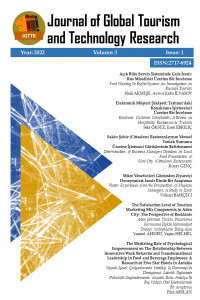ALGILANAN HİZMET KALİTESİNİN MARATON KATILIMCILARININ MEMNUNİYETİNE ETKİSİ: GELİBOLU MARATONU ÖRNEĞİ
Maraton Etkinlikleri, Algılanana Hizmet kalitesi, Memnuniyet, Gelibolu maratonu
___
- Akdağ G., Güler O., Duran A., Dalgıç A., Benli S., Dönmez B. (2015). Spor Organizasyonlarında Algılanan Hizmet Kalitesi Ve Memnuniyet: 17. Akdeniz Oyunlarına Katılan Sporcular Üzerine Bir Araştırma.Çağ Üniversitesi Sosyal Bilimler Dergisi, 12(1).
- Alexandris A., (2016) "TestingThe Role Of SportEventPersonality On The Development Of EventInvolvementAndLoyalty: The Case Of MountainRunningRaces", International Journal Of EventAnd Festival Management, 7(1), 2-20.
- Alexandris, K.,Theodorakis, N., Kaplanidou, K.;Papadimitriou, D. (2017). EventQualityAndLoyaltyAmongRunnersWithDifferentRunningInvolvementLevels: The Case Of “The Alexander The Great” International Marathon. International Journal Of EventAnd Festival Management, 8(3), 292-307.
- Argan M. (2013). Etkinlik Kavramı ve Türleri. H. Ertan (Ed.), Etkinlik Yönetimi. AÖF Yayınları, Eskişehir.
- Bob, U.,Arrey, V. M. E.;Swart, K. (2008). SportEventsAndTheirSocio-EconomicImpact: Residents' Perceptions Of TheIsuzuBergRiverCanoeMarathon. AfricaInsight, 38(3), 123- 134.
- Brady, M. K.,&CroninJr, J. J. (2001). Some New Thoughts On Conceptualizing Perceived Service Quality: A HierarchicalApproach. Journal Of Marketing, 65(3), 34-49.
- Brady, M. K.,Voorhees, J. J., Cronin, Jr., J.;Bourdeau, B. L. (2006). Thegoodguysdon’talwayswin: Theeffect of valence on service perceptionsandconsequences. Journal of Services Marketing, 20, 83–91
- Burfoot, A. (2007). TheHistory Of TheMarathon. Sports Medicine, 37(4-5), 284-287.
- Chang, H. M.,Huang, Y. C.;Chou, C. L. (2017). A Study On ParticipationMotivation, Satisfaction, AndLeisureBenefit Of Road Runner-Case Study Of 2016 TaiwanMaoli Road Race. AsianJournal Of Business And Management, 5(3).
- Chen, L. H.,Chen, M. Y., Ye, Y. C., Tung, I. W., Cheng, C. F.;Tung, S. (2012). Perceived service qualityand life satisfaction: Themediating role of theactor’ssatisfaction-with-event. International Journal of Sports Marketing andSponsorship, 13(4), 249–266.
- Choi, T. Y.;Chu, R. (2001). Determinants Of Hotel Guests’ Satisfaction And Repeat PatronageIn The Hong Kong Hotel Industry. International Journal Of Hospitality Management, 20(3), 277- 297.
- Coşkun, R.,Altunışık, R.; Yıldırım, E.. Sosyal Bilimlerde Araştırma Yöntemleri SPSS Uygulamalı. İstanbul: Sakarya Yayıncılık, 2017.
- Dagger, T. S.;Sweeney, J. C. (2006). Theeffect of service evaluations on behavioral intentions and quality of life. Journal of Service Research, 9(1), 3–18.
- Fornell, C. (1992). A National Customer Satisfaction Barometer: The Swedish Experience. TheJournal Of Marketing, 6-21.
- Getz, D. (1997). Event Management &Event Tourism. Cognizant Communication Corporation, New York.
- Gibson, H. J.,Kaplanidou, K.;Kang, S. J. (2012). Small-Scale Event Spor tTourism: A Case Study In Sustainable Tourism. Sport Management Review, 15(2), 160-170.
- Greenwell, C. T., Fink, J. S.;Pastore, D. L. (2002). Assessing the influence of the physical sports facility on customer satisfaction within the context of the service experience. Sport Management Review, 5, 129–148.
- Hsiao-Ching, H. (2017). A Study Of Runners' Marathon Race Participation Motivations, Service Satisfaction And Perceived Leisure Benefits. AdvancesIn Management, 10(10), 18-22.
- Kline, R. B. (1998). Methodology in thesocialsciences. Principlesandpractice of structuralequationmodeling. New York, NY, US: GuilfordPress.
- Kyle, G. T.,Theodorakis, N. D., Karageorgiou, A.;Lafazani, M. (2010). TheEffect Of Service Quality On Customer Loyalty Within The Context Of Ski Resorts. Journal Of Park AndRecreation Administration, 28(1).
- Lucas John A. (1976). A History Of The Marathon Race 490 B.C. To 1975. Journal Of Sport History, 3(2), 120-138.
- Oliver, R. L. (1980). A Cognitive Model Of The Antecedents And Consequences Of Satisfaction Decisions. Journal Of Marketing Research, 460-469.
- Parasuraman, A.,Zeithaml, V. A.;Berry, L. L. (1985). A Conceptual Model Of Service Quality And Its Implications For Future Research. TheJournal Of Marketing, 41-50.
- Parasuraman, A.,Zeithaml, V. A.;Berry, L. L. (1994). AlternativeScalesForMeasuring Service Quality: A Comparative Assessment Based On sychometric And Diagnostic Criteria. Journal Of Retailing, 70(3), 201-230.
- Park, S. H.,Hsieh, C. M.; Miller, J. C. (2018). Moderating Effects Of Recreation Specialization On The Quality-Value-Loyalty Chain: A Case Of The Taroko Gorge Marathon. International Journal Of Tourism Sciences, 18(1), 29-42. Romiti, A.;Sarti, D. (2014, September). Determinants Of Active Sport Tourists’ Satisfaction: The Case Of An International Marathon. In Proceedings Of 3rd European Business Research Conference (Pp. 4-5).
- Saayman M.,Saayman A., (2012) "The EconomicImpact Of The Comrades Marathon", International Journal Of Event And Festival Management, 3(3),220-235,
- Theodorakis, N.,Kambitsis, C., Laios, A.;Koustelios, A. (2001). Relationship sbetween measures of service qualityand satisfaction in professional sports. Managing Service Quality, 11, 431–438.
- Theodorakis, N. D.,Alexandris, K., Tsigilis, N.;Karvounis, S. (2013). Predicting spectators’ behavioral intentions in professional football: The role of satisfaction and service quality. Sport Management Review, 16, 85–96.
- Theodorakis, N. D.,Kaplanidou, K.;Karabaxoglou, I. (2015). Effect Of Event Service Quality And Satisfaction On Happiness Among Runners Of A Recurring Sport Event. Leisure Sciences, 37(1), 87-107.
- Tüfekci, Ö. (2014). Spor Pazarlamasında Tüketici Temelli Marka Değerini Belirlemeye Yönelik Nitel Bir Araştırma: 9. Uluslararası Öger Antalya Maratonu (Runtalya) Örneği. International Journal Of Human Sciences, 11(2), 770-787.
- West, S. G.,Finch, J. F.;Curran, P. J. (1995). Structural equation models with nonnormal variables: Problems and remedies. In R. H. Hoyle (Ed.), tructural equation modeling: Concepts, issues, and applications (pp. 56-75). Thousand Oaks, CA, US: Sage Publications, Inc.
- Yoshida, M.; James, J. (2010). Customer satisfaction with game and service experience: Antecedents and consequences. Journal of Sport Management, 24, 338–361.
- Yoshida, M.; James, J. D. (2011). Service Quality At Sporting Events: Is Aesthetic Quality A Missing Dimension?. Sport Management Review, 14(1), 13-24.
- Zeithaml, V. A.,Berry, L. L.;Parasuraman, A. (1988). Communication And Control Processes In The Delivery Of Service Quality. The Journal Of Marketing, 35-48.
- Zeithaml, V. A.,Berry, L. L.;Parasuraman, A. (1996). The Behavioral Consequences Of Service Quality. The Journal Of Marketing, 31-46.
- ISSN: 2717-6924
- Yayın Aralığı: Yılda 2 Sayı
- Başlangıç: 2020
- Yayıncı: TROAS Uluslararası Turizm Araştırmaları Derneği
BELEDİYE BELGELİ TESİSLERİN WEB SİTELERİNE YÖNELİK DEĞERLENDİRME: BURHANİYE ÖRNEĞİ
Mehmet Oğuzhan İLBAN, Duygu HARBALİOĞLU
USE OF TECHNOLOGY IN MUSUEUMS, SAMPLE APPLICATIONS
ALGILANAN HİZMET KALİTESİNİN MARATON KATILIMCILARININ MEMNUNİYETİNE ETKİSİ: GELİBOLU MARATONU ÖRNEĞİ
Hacı Mehmet YILDIRIM, Hüseyin Süleyman BÜYÜKTEPE, Uğurkan SAVAŞCI
